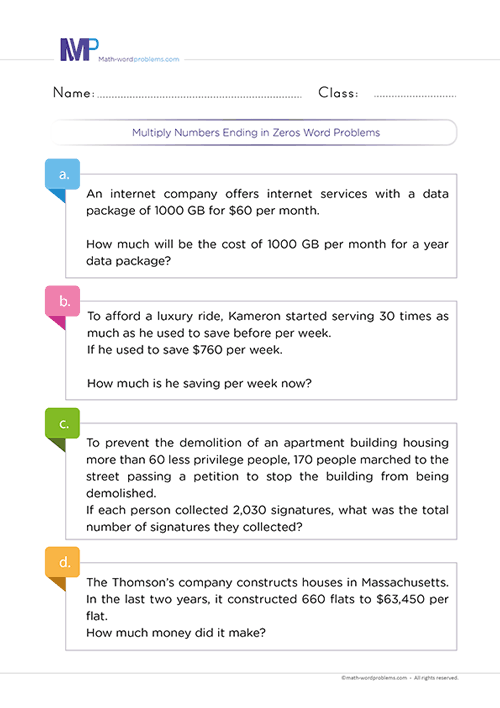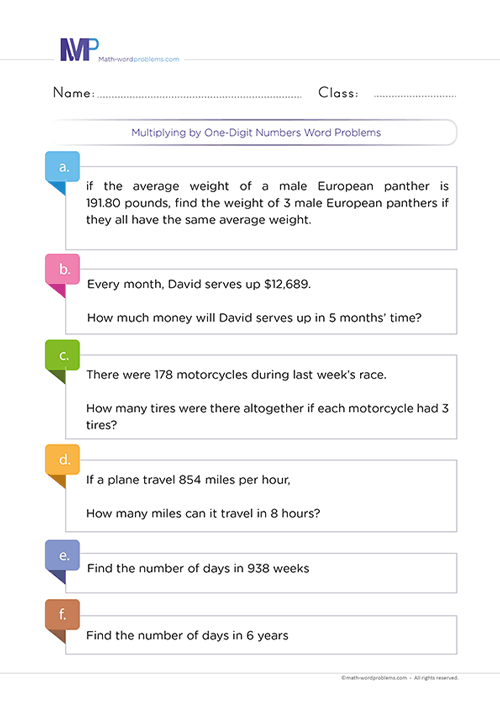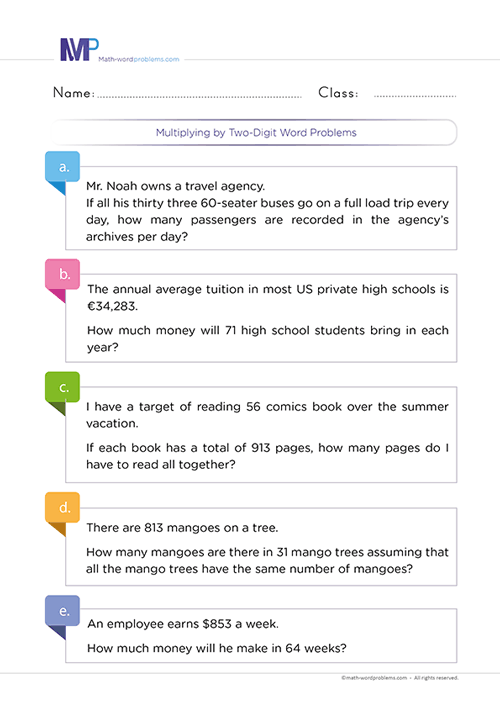 How to perform multiplication of numbers ending in zeros word probelms
How to perform multiplication of numbers ending in zeros word probelms
Discover how to perform multiplication of numbers ending in zeros word problems using straightforward steps and solving tips. We will offer these powerful step-by-step guides below, hoping that 5th graders will get closer to mastering the skills of multiplying numbers ending in zero-word problems.
Word problems always present situations in which learners must use the information to determine the formula for finding a solution to that problem. That is why, if they follow this step-by-step guide below, they will easily determine the formula to solve all these complex multiplication word problems the
Your 5th graders will find these steps to perform multiplication of numbers ending in zeros word problems easy and appealing to use. Our reason for designing these strategic well-organized steps is to guide kids and enable them to understand what word problems are all about.
Most importantly, we have described unique procedures with tips on how kids can efficiently plan and multiply numbers ending in zeroes word problems. With this in mind, we have added real-life examples to show how engaging these steps are.
y encounter.
Steps to perform multiplication of numbers ending in zeros word problems
Step 1: IDENTIFY THE PROBLEM
To identify the problem, you must read the word problem very carefully to know what the problem wants you to solve.
Also, figure out important numbers and keywords in the word problem. For instance, If you come across one of the following keywords in a word problem: - times, multiplied by, product, product of, factor, of, multiply, times, multiple, double, triple, groups, by, twice, area, equal groups, every, in all, total, increased by, as much, each, lots of, groups of, per, etc., then it implies that you have to perform a Multiplication Operation.
Note: One key Element for learners to understand is that they should not always rely on keywords alone. That is to say; the same keyword can have different meanings in different word problems.
For this reason, we reiterate on the importance of reading the question very carefully to understand the situation that the word problem is describing, then figure out exactly which operation to use
Step 2: STRATEGIZE OR GATHER RELEVANT INFORMATION
How are you going to tackle the problem?
- As mentioned in step 1 above, the keyword(s) in the word problem will enable you to determine if you need to perform a Multiplication Operation.
- Then again, it would be best not to depend entirely on keywords. Rather, to understand the situation that the problem is describing.
- Once you already know the operation, you will perform, construct short sentences to represent the given word problem.
Step 3: SET UP AN EQUATION
Here, you need to write down a numerical equation representing the information given in the word problem.
Step 4: PROVIDE A SOLUTION
From step 3 above, multiply the numbers using regrouping or other multiplication methods like long multiplication, grid multiplication, or lattice to determine the result, not forgetting to add the unit of measurement to your final answer, if any.
Step 5: CHECK YOUR WORK
Finally, check if your answer makes sense. For instance, estimate the answer and see if it is close to what you expected. However, if the answer is not what you expected, go back to step one and start all over again.
Examples on how to perform multiplication of numbers ending in zeros word problems
Example one
Step 1:The important numbers here are 12,200 and 400. The most important keyword(s) found in the word problem is "each."
Step 2:Now, how are you going to tackle the problem? As seen in step 1 above, the problem's scenario and the keyword(s) call for a multiplication operation.
Next, after knowing the operation you will perform, form short sentences to represent the given word problem.
- Number of boxes of apples = 12,200.
- Number of apples in each box = 400.
- Therefore, the number of apples in 12,200 boxes = the number of boxes of apples × the number of apples in each box.
Step 3:Now, write down a numerical expression to represent the bolded sentence in step 2 above to solve this word problem:
→ 12,200 × 400 = ?
Step 4: From step 3 above, multiply the numbers using regrouping or any other multiplication methods like long multiplication, grid multiplication, and lattice to determine the result. Always recall the unit of measurement, if any.
Using the long multiplication method, we have
So, 4,880,000 apples are in 12,200 boxes.
Step 5: Finally, check if your answer makes sense. For instance, estimate the answer and see if it is close to what you expected. However, if the answer is not what you expected, go back to step one and start all over again.
Example two
Step 1:Frist, after reading the problem very keenly, you see that the most important keyword(s) found in the word problem is "how many."
Step 2:Now, how are you going to tackle the problem? As seen in step 1 above, the keyword found in the problem could mean an addition operation, a subtraction operation, a multiplication operation, or even a division operation.
So you see, relying on keywords alone cannot help you. You have to dig deep to understand what the problem is describing.
Now from the scenario that the problem presents, you need to perform a multiplication operation.
Next, after knowing the operation you will perform, form short sentences to represent the given word problem.
- If 1000 years = 1 millenuim
- Therefore, the number of years in 45,269 millennia = 45,269 × the number of years in one millennium.
Step 3:Now, write down a numerical equation to represent the bolded statement in step 2 above to solve this word problem:
→ 45,269 x 1,000 = ?
Step 4: From step 3 above, multiply the numbers using regrouping or any other multiplication methods like long multiplication, grid multiplication, and lattice method to determine the result. Always recall adding the unit of measurement to your final results.
Using the long multiplication method, we have
So, there are 45,269,000 years in 45,269 millennia.
Step 5: Finally, check if your answer makes sense. For instance, estimate the answer and see if it is close to what you expected. However, if the answer is not what you expected, go back to step 1 and start all over again.






